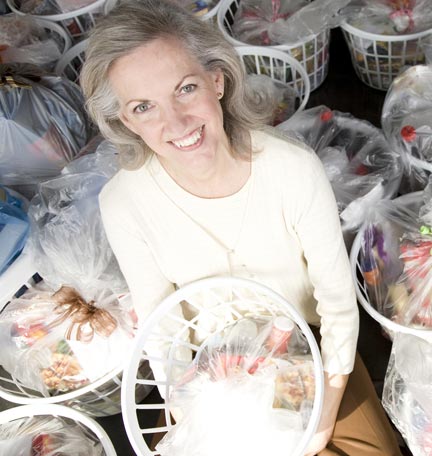Early exposure to banking and investment accounts can teach responsibility while kids are still young.
Financial literacy begins at home, but it’s a big leap for children to go from counting pennies to the abstract concept of credit card use and pretax dollars. They start with a weekly allowance but are soon thrust into a world of student loans, paychecks and bank accounts—and the risks and rewards that come with financial independence.
Stephanie Coln, Louisiana Private Wealth Management Leader, recalls a Regions piggy bank she used with her two daughters when they were young. “It was really the first money-related activity we did as a family,” she says. “Piggy banks are a great visual reminder of how money grows.”
After teaching that important first lesson, Coln instilled many more. From her work with Regions’ high-net-worth clients, she knows that to become an adult with significant assets requires a strong understanding of financial concepts—and a commitment to staying informed and vigilant when it comes to managing them. She recommends exposing your own kids to the array of savings, spending and investment options available from childhood through early adulthood and the lessons about money along the way. “It takes intentionality,” says Coln.
Here are tips on raising financially literate kids and a look at the types of tools you may implement along the way.
Start With Savings Accounts
“When your children start receiving gifts for birthdays and holidays, it’s a good time to consider a minor savings account,” Coln says, though she remembers one client opening one for a newborn. “He couldn’t wait!”
Consider bringing your children to a local branch to open their accounts. While online banking has its conveniences, coming into the bank lobby and seeing the paperwork processed for their very own savings accounts can make an impression.
Minor savings accounts tie to a parent’s Social Security number and are technically jointly owned, but children get to watch the savings grow and the money belongs to them, too. It’s a great way to transfer family values related to saving, giving and spending and to empower kids to make decisions about how to use those funds, Coln says.
During their teenage years, work with your children to identify a financial goal, such as saving for a first car. That can provide them with an incentive for getting that first job and making wise decisions about how much—and when—they touch their savings.
Coln and her husband required their daughters to pay for half of their first cars—a firm line to take that established the importance of smart saving strategies. “It’s really important to help teens set short- and long-term financial goals,” she says. Those lessons translate easily to larger financial strategy conversations.
Introduce Checking Accounts and Debit Cards
As they age, consider adding a checking account to your student’s arsenal of financial products, separating the money that’s growing in savings from cash they can access and spend. The Regions LifeGreen® Student Checking Account for ages 18–25, for example, doesn’t have monthly fees and offers alerts and notifications, as well as a debit card.
Once again, Coln recommends returning to the branch, where banking associates may echo the advice you want your children to hear about responsible checking account use. “Associates will show them how to set up mobile payment reminders and discuss overdraft fees and how to prevent them,” she says. “Having that personalized banking experience teaches life skills.”
The checking account gives parents peace of mind, knowing their kids can pay for $10 worth of gas if they need it, for example. And it teaches them firsthand that money does run out. Account balances will, in fact, reach zero, they’ll discover. “It teaches them to pay attention to spending habits,” Coln says.
The debit card can also work as precursor to a credit card. They will need to learn to guard against fraud. Coln’s daughter, a student at Louisiana State University, lost a card during the excitement after a big football game as students mingled on the field. “She knew to go online immediately and block future transactions on her card,” Coln says.
Build Financial Literacy With Credit Cards
Not only do cards offer convenience, but they also help young adults start to build their own credit history and a reputation among lenders—for better or for worse.
“Credit cards teach how to manage money in a different way,” Coln says. “They are a central piece of financial literacy. The way you manage a credit card as a young adult can have real impact on your financial future.” She notes that creditworthiness ties to many aspects of young adult life, from getting an apartment lease to taking out a car loan or mortgage.
Parents can stay involved as a co-signer and encourage their children to set up monthly payment reminders. Parents can also share online webinars, podcasts and other resources with their children on everything from credit scores to budgeting.
Explain Long-Term Planning With Retirement Accounts
Even from a young age, a Roth IRA can work in your child’s favor. These investment vehicles allow them to save and potentially grow those savings over time, all while learning about pre- and post-tax dollars. A custodial Roth IRA puts parents in total control, and they can begin sharing details when their child is ready.
Your Private Wealth Advisor can meet with you and your child when the account is opened, or you can go to a bank branch just like you would with a savings or checking account. “Having a professional willing to take the time to walk you through how a starter Roth IRA works, or to explain basic terms like stocks and bonds, is a great service,” says Coln.
A meeting may also provide you with the opportunity to discuss the importance of 401(k) contributions as your child enters the workforce. “Don’t let them miss matching funds from an employer,” Coln says.
Start Establishing a Solid Foundation Today
Many young adults will start to learn about personal accountability and banking when they get their first jobs or need money to go out with their friends. But at home, talking about money can start much younger. “It’s important to connect the dots for your children and to set them up on a solid foundation,” Coln says.
From piggy banks to starting 401(k) or retirement accounts, Coln says financial literacy is a journey. “It’s not a one-and-done conversation,” she says.
Talk to Your Regions Wealth Advisor About:
- Creating a plan to share your financial wisdom with your next generation.
- Steps you can take to build generational wealth.
Interested in talking with an advisor but don’t have one?
Find a contact in your area.











